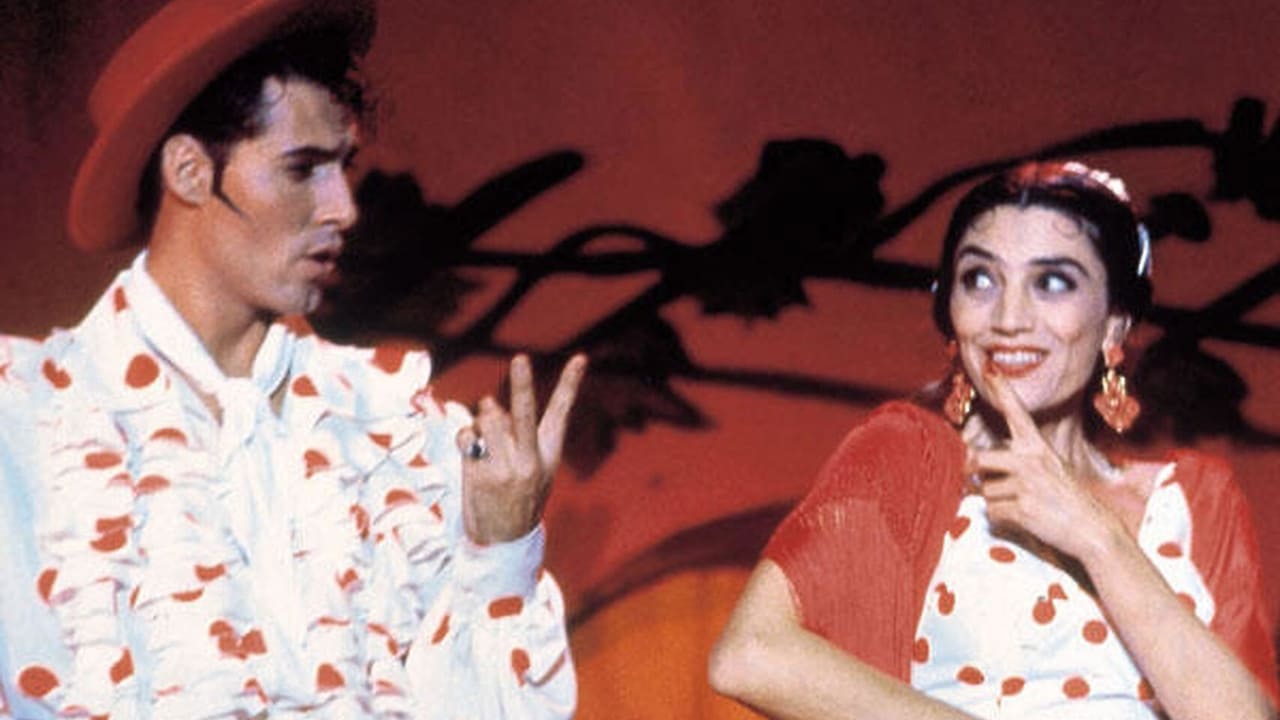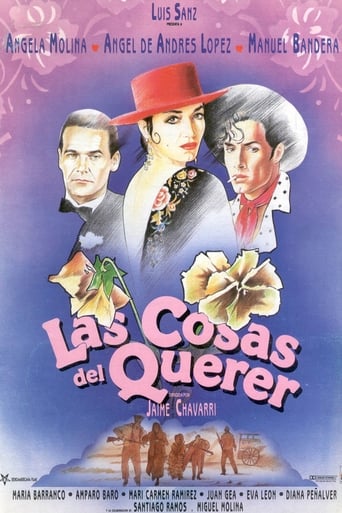ma-cortes
Decent though uneven movie about theatrical spectacles during post-Civil War (1936-1939) . 1939's Madrid , during Civil War , Pepita (Angela Molina) , a Coplas singer meets Juan (Angel De Andres Lopez) and both of them fall in love , but they follow different paths . One time finished ¨Civil War¨ Juan and his gay friend Mario (Manuel Bandera) spend time in cheap shows but their ways cross with Pepita . Once again they meet and work in same musical spectacle , getting a considerable success . As during the General Franco years of dictatorship acting in several musical spectacles , Juan plays piano for Pepita and her on-stage partner Mario playing catching folk songs . Although Mario really loves to Juan for himself , however Juan is not interested in him . Then Mario resorts to a string of lovers and when he leaves a wealthy man (Juan Gea) things go wrong . Typical Spanish post-war drama with good actors , spectacular musical numbers singing attractive Coplas , and nice direction . This is an agreeable as well as uneven drama in less than 120 minutes of length and yet with an air of naturalness and credibility rarely match . This is an enjoyable post-Civil drama including a love story , Flamenco shows and the ordinary Spanish clichés . It has some moments of enjoyment as well as amusement and others quite a few embarrassing . Colorful story of love and jealousy in which a gorgeous singer and her homosexual friend seduce several men and women , being partially based on facts , as the character played by Manuel Bandera seems to be the singer Miguel De Molina . It tends to glamorize the forties with its music , parties , dances and popular shows . There are brief moments of drama , but predominates Copla songs and musical spectacle . Angela Molina and Manuel Banderas steal the show , interpreters who provided a considerable boost to the result , both of whom play wonderful and classic Spanish songs such as ¨¨La Bien paga¨ , ¨Hijo De Espartero Quieren Meterle a Fraile¨ and ¨Cosas del Querer¨ . The main cast is pretty well and support cast is frankly good such as María Barranco , Amparo Baró , Mary Carmen Ramírez , Diana Peñalver , Juan Gea , Rafael Alonso , Eva León , Ricardo Palacios , Francis Lorenzo , Luis Barbero and Manuel Gallardo . Colorful and glowing cinematography by Hans Burmann which heightens the ambiance, being shot in Madrd and Andalucia location . Burmann is deemed to be one of the best Spanish cameraman ; Hans has photographed notorious films such as Tesis , Abre Los Ojos , Guantanamera , Paris Tombuctu , and several others . Evocative musical score by Gregorio Garcia Segura and with plenty of known songs from the 40s . It was followed by ¨Cosas Del Querer¨ 2 (1995) including similar artistic and technician team with Ángela Molina , Manuel Bandera , Susú Pecoraro , Darío Grandinetti , Amparo Baró , Anabel Alonso and Antonio Valero . This motion picture "The Things of Love" or ¨Las Cosas Del Querer¨ lavishly produced Luis Sanz was decently directed Jaime Chavarri . His first professional movie was ¨Los Viajes Escolares¨ (1974), with an autobiographical touch but it was misunderstood by most critics . Later he worked with the producers 'Elías Querejeta' in prestigious documentary titled ¨El Desencanto¨ (1976)) and Alfredo Matas in a successful costumer titled ¨Bearn¨ (1983), adapted from the novel by Llorenç Vilallong a. With the last mentioned film he also had success in terms of the numbers who saw the film . He also directed intense dramas such as ¨Dedicatoria¨ and ¨A un Dios Desconocido¨ . To change the genre he also filmed the musical, ¨Las Cosas del Querer¨ (1989) , being followed by ¨Cosas Del Querer 2¨ (1995) , along with a Tango film as ¨Tangos Are for Two¨ . And adapted from the theatre play by Fernando Fernán Gómez in his most popular film titled ¨Bicicletas Son Para Verano¨ . His last picture was a biography about ¨Camarón¨ (2005) .
pldeaguinaga
This is not the best Spanish film ever made, or the one with the larger budget, but it was done with grace and dignity, getting the right mood before and after the General Franco years of dictatorship. Everybody act quite well, ¡but they sing even better! (Molina and Bandera). The music is great, if you like folk traditional Spanish music. This soundtrack is one of my favorites of that sort (as well the second one, although I did not see that movie). I became fan of the couple, specially Molina, who was one of the girls of Buñuel film "That obscure object of desire" (the other one was Carole Bouquet). An interesting point is the telling about how authorities and people though about homosexuality in those days. There are some coincidences with the life of Spanish singer Miguel de Molina, who after being incarcerated because of his homosexuality, went to live in exile to Argentina (he used to sing some of those songs too).

